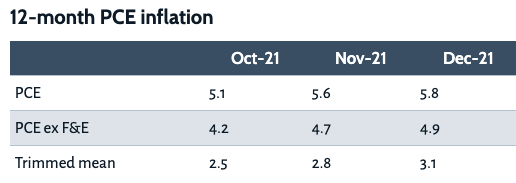It's CPI time: How badly will we catch America's inflation "cold"?
When America sneezes, the world catches a cold - or maybe even, this time, a plague. The US hands down its April inflation numbers tonight and the whole world will be paying attention. This wire will examine the projections heading into tonight's call and what the professionals are doing to temper market nervousness.
After all, a print that's way too hot for the Federal Reserve's proverbial oatmeal bowl will lead to some serious questions about the path of monetary policy.
Evaluating the consensus
Let's get one thing on the table - this print is going to be hot, hot, hot.
The Bloomberg forecast range is from 7.9% (Bank of America) to 8.5% (Berenberg). Most economists are clustered around an 8.1% headline, year-on-year print which would be both priced in and at the same time, four times above the Federal Reserve's own inflation target.
Multiples of four in a month, let that sink in for a second.
Now for the good (ish) news - some predict that we are nearing peak inflation even though others have said that it's a fruitless exercise to try and predict it.
One of those was Blackrock's Rick Rieder who says that some factors which contribute to inflation are finally near the top thanks to a better situation at ports in the US as well as a backoff in copper and crude oil prices (albeit this trend isn't all that clear yet).
For its part, Capital Economics thinks we'll see inflation at a much more friendly four per cent handle by the end of 2022. But is a 4 per cent handle really realistic, let alone possible in the current environment?
Here's the thesis:
"It’s likely to be just under 4% as we are expecting some categories to decline from here – namely energy and used vehicles, while others keep rising but at a slower pace as supply and labor shortages ease."
JP Morgan's Michael Hanson agrees, arguing the US Dollar could provide some clues as to why the US' inflation woes might be peaking soon (though that may not be the case elsewhere).
A strong USD may exacerbate the global inflationary pressures facing other central banks - particularly against a backdrop of sharply rising food prices and a drift higher of oil prices in coming weeks.
The other key reason why some economists suspect we might be past the peak is in the data that comes from the Federal Reserve.
For one, the trimmed mean price index produced by the Dallas branch of the Fed sees inflation (minus food and energy) at just 3.1% by the end of 2022. Coming down from March's print of 3.7% means that a particular survey may suggest inflation peaked at the beginning of this year.

Roll out the speakers!
Ahead of this week's inflation print, the Federal Reserve has been rolling out the red carpet for its best and brightest to speak to media and investors alike. They do this all the time - it's a way for them to establish credibility, seal strong messaging, and most importantly of all, temper market expectations.
Here are just some of what has been said this week.
Atlanta Federal Reserve President Raphael Bostic: I would say that (a 75-basis-point rate hike) is a low probability outcome given what I expect will happen in the economy over the next three to four months. (Reuters)
New York Federal Reserve President John Williams: When I think of a soft landing, it's really a matter of, yes we could see growth below trend for a while and we definitely could see unemployment moving up somewhat but not in a huge way. (Comments at a German central bank conference)
Richmond Federal Reserve President Thomas Barkin: "Once we get in the range of the neutral rate, we can then determine whether inflation remains at a level that requires us to put the brakes on the economy or not" (Prepared remarks for a Maryland chamber of commerce address)
Biden's headache
To call soaring inflation a headache for governments is fairly appropriate, but to call it a problem in an election year is particularly problematic. In the US, President Joe Biden now considers inflation his "top domestic priority" ahead of key elections for Congress in November. Any loss of majority in either house will make his life significantly more difficult.
In his prepared remarks, Biden noted the following:
While I will never interfere with the Fed’s judgments and sit here and tell them what to do — they’re independent — I believe that inflation is our top economic challenge right now, and I think they do too.
In an election year, where a prolonged recession is the last thing the global economy needs after two years of the pandemic, tonight could provide some telling clues about what the rest of 2022 will look like for investors.
Never miss an insight
If you're not an existing Livewire subscriber you can sign up to get free access to investment ideas and strategies from Australia's leading investors.
We'll cover the aftermath here at Livewire in a special weekend feature looking at the inflation problem in America - and how that might change the game for Australian investors even if it's not the one thing that keeps you up at night. Hit follow on my profile to know when that piece goes live!
3 topics

